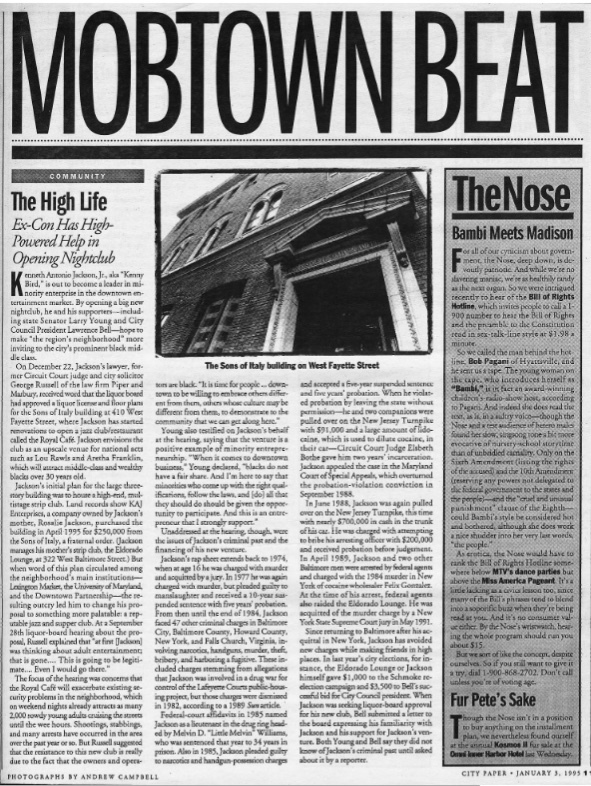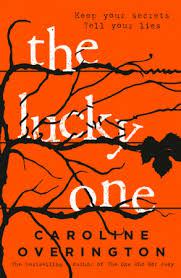By Van Smith
Published in City Paper, Jan. 3, 1996

Kenneth Antonio Jackson, Jr., aka “Kenny Bird,” is out to become a leader in minority enterprise in the downtown entertainment market. By opening a big new nightclub, he and his supporters – including state Senator Larry Young and City Council President Lawrence Bell – hope to make “the region’s neighborhood” more inviting to the city’s prominent black middle class.
On December 22, Jackson’s lawyer, former Circuit Court judge and city solicitor George Russell of the law firm Piper and Marbury, received word that the liquor board had approved a liquor license and floor plans for the Sons of Italy building at 410 West Fayette Street, where Jackson has started renovations to open a jazz club/restaurant called the Royal Café. Jackson envisions the club as an upscale venue for national acts such as Lou Rawls and Aretha Franklin, which will attract middle-class and wealthy blacks over 30 years old.
Jackson’s initial plan for the large three-story building was to house a high-end/multistage strip club. Land records show KAJ Enterprises, a company owned by Jackson’s mother, Rosalie Jackson, purchased the building in April 1995 for $250,000 from the Sons of Italy, a fraternal order. (Jackson manages his mother’s strip club, the Eldorado Lounge, at 322 West Baltimore Street.) But when word of his plan circulated among the neighborhood’s main institutions – Lexington Market, the University of Maryland, and the Downtown Partnership – the resulting outcry led him to change his proposal to something more palatable: a reputable jazz and supper club. At a September 28th liquor-board hearing about the proposal, Russell explained that “at first [Jackson] was thinking about adult entertainment; that is gone. … This is going to be legitimate. … Even I would go there.”
The focus of the hearing was concerns that the Royal Café will exacerbate existing security problems in the neighborhood, which on weekend nights already attracts as many as 2,000 rowdy young adults cruising the streets until the wee hours. Shootings, stabbings, and many arrests have occurred in the area over the past year or so. But Russell suggested that the resistance to this new club is really due to the fact that the owners and operators are black. “It is time for people … downtown to be willing to embrace others different from them, others whose culture may be different from them, to demonstrate to the community that we can get along here.”
Young also testified on Jackson’s behalf at the hearing, saying that the venture is a positive example of minority entrepreneurship. “When it comes to downtown business,” Young declared, “blacks to not have a fair share. And I’m here to say that minorities who come up with the right qualifications, follow the laws, and [do] all that they should do should be given the opportunity to participate. And this is an entrepreneur that I strongly support.”
Unaddressed at the hearing, though, were the issues of Jackson’s criminal past and the financing of his new venture.
Jackson’s rap sheet extends back to 1974, when at age 16 he was charged with murder and acquitted by a jury. In 1977 he was again charged with murder, but pleaded guilty to manslaughter and received a 10-year suspended sentence with five years’ probation. From then until the end of 1984, Jackson faced 47 other criminal charges in Baltimore City, Baltimore County, Howard County, New York, and Falls Church, Virginia, involving narcotics, handguns, murder, theft, bribery, and harboring a fugitive. These included charges stemming from allegations that Jackson was involved in a drug war for control of the Lafayette Courts public-housing project, but those charges were dismissed in 1982, according to a 1989 Sun article.
Federal-court affidavits in 1985 named Jackson as a lieutenant in the drug ring headed by Melvin D. “Little Melvin” Williams, who was sentenced that year to 34 years in prison. Also in 1985, Jackson pleaded guilty to narcotics and handgun-possession charges and accepted a five-year suspended sentence and five years’ probation. When he violated probation by leaving the state without permission – he and two companions were pulled over on the New Jersey Turnpike with $91,000 and a large amount of lidocaine, which is used to dilute cocaine, in their car – Circuit Court Judge Elsbethe Bothe gave him two years’ incarceration. Jackson appealed the case in the Maryland Court of Special Appeals, which overturned the probation-violation conviction in September 1988.
In June 1988, Jackson was again pulled over on the New Jersey Turnpike, this time with nearly $700,000 in cash in the trunk of his car. He was charged with attempting to bribe his arresting officer with $200,000 and received probation before judgement. In April 1989, Jackson and two other Baltimore men were arrested by federal agents and charged with the 1984 murder in New York of cocaine wholesaler Felix Gonzalez. At the time of his arrest, federal agents also raided the Eldorado Lounge. He was acquitted of the murder charge by a New York State Supreme Court jury in May 1991.
Since returning the Baltimore after his acquittal in New York, Jackson has avoided new charges while making friends in high places. In last year’s elections, for instance, the Eldorado Lounge or Jackson himself gave $1,000 to the Schmoke re-election campaign and $3,500 to Bell’s successful bid for City Council president. When Jackson was seeking liquor-board approval for his new club, Bell submitted a letter to the board expressing his familiarity with Jackson and his support for Jackson’s venture. Both Young and Bell say they did not know of Jackson’s criminal past until asked about it by a reporter.
George Russell would not comment for this article, but Jackson says of his criminal history, “I’m trying hard to put my past in the past.” As indication of his efforts to do so, Jackson points out several public-service awards he has received in recent years, including a 1994 Mayor’s Citation from Kurt Schmoke and a 1990 Congressional Achievement Award from Kweisi Mfume. He is active in the newly formed political-action committee, A Piece of JUICE, which works to get African American men involved in the political process.
Shortly before the April 1995 purchase of the Sons of Italy building, however, Jackson and the building both figured in an undercover FBI investigation into the drug-money-laundering operations of businessman Gregory Scroggins and attorney Zell Margolis, who were convicted in December 1995. First assistant United States attorney Gary Jordan, who prosecuted the case, says that in March 1995, Scroggins introduced Jackson to Edward Dickson, a man he though was a drug dealer but was actually an undercover FBI agent. The purpose was to convince Jackson to let Dickson in on the purchase as a “silent partner,” Jordan says. FBI transcripts of wiretapped conversations in the case document Scroggins’ opinion of Jackson, a childhood friend, as very wealthy, highly intelligent, and “the nicest guy in the world, but he’s a killer and he has killed.”
As for the nightclub’s financing, land records indicate that KAJ Enterprises obtained a $200,000 mortgage from Maryland Permanent Bank and Trust of Owings Mills to finance the $250,000 purchase of the Sons of Italy building. The mortgage calls for monthly payments of more than $2,300.
Meanwhile, court records indicate that Jackson’s employment at the Eldorado Lounge paid $325 a week in 1988, although he says he now makes substantially more than that. Since Jackson is a convicted felon, he cannot apply for a liquor license; Mary Collins, who refused interview requests, applied instead. She is a guidance counselor for Baltimore City Public Schools.
Regarding the financing for the new club, Jackson explains that all expenses not covered by the $200,000 mortgage so far have been covered by revenue from the Eldorado Lounge. The extensive renovations to the Sons of Italy building ultimately will require a sizable bank loan, he says, adding that the Eldorado Lounge has applied for a $500,000 loan from Nationsbank.
Asked why the liquor board did not inquire during the September 28th hearing about the club’s financing or whether Collins has the money to fund such a major investment, liquor-board executive secretary Aaron Stansbury explained that the board simply chose not to. He also stated that it is “obviously illegal” for a straw person to hold a liquor license on behalf of the actual owner of the club, but his understanding is that Collins is the club owner, while KAJ Enterprises is merely the landlord; Stansbury says that it is legal for a landlord to fund the building renovations on the club’s behalf. “It is presumed by the board that [the money for the club] comes from Mary Collins,” Stansbury said. Of Jackson’s criminal background, Stansbury said the board was not aware of it “to the extent that [Jackson] couldn’t manage the club.”
Share this:- Share





